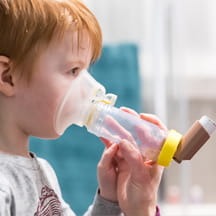Infectious disease researchers and scientists around the globe are racing to develop a vaccine for the novel coronavirus (COVID-19). In line with its mission to foster international collaboration to advance next-generation vaccines, Boston Children's Hospital's Precision Vaccines Program (PVP) is contributing to this worldwide effort.
Specifically, PVP researchers are focusing on one aspect of the vaccine development. "We're targeting adjuvants," says Ofer Levy, M.D., Ph.D., director, Precision Vaccines Program, Boston Children's Hospital. "They're like rocket fuel for boosting the immune response."
Adjuvants make vaccines adaptable, scalable
An adjuvant is an ingredient used in some vaccines that helps create a stronger immune response in people receiving the vaccine. Basically, adjuvants help vaccines work better—and Levy says there are many reasons they are vitally important to the development of an effective vaccine for COVID-19:
- Scale. Adjuvants make millions of doses of a vaccine cost-effective, something that will be necessary in response to a global pandemic.
- Duration. They help vaccines maintain their effectiveness for longer time periods, reducing the need for more frequent doses.
- Specialization. Responses to adjuvants are age-specific, so scientists can tailor vaccines specifically to suit various age groups. Levy says his team is now testing different adjuvants against blood samples from elderly subjects to see which best activate a white blood cell response. "That's critical," Levy says. "We're innovating to develop adjuvanted coronavirus vaccines in that way."
Collaboration key in overcoming vaccine development challenges
Creating effective adjuvants is just one piece of the vaccine development puzzle. As countless teams around the world work toward vaccine components, Levy says it's critical they collaborate.
"Within the U.S., we're seeing unprecedented levels of collaboration between academia, government and industry," Levy says. "It's all very impressive how people are working together."
Facilitating collaboration among often-competing research teams isn't the only challenge in developing a COVID-19 vaccine. Balancing the tension between the desire to speed a vaccine to market with the need for it to be safe is a primary hurdle, according to Levy. And once an effective vaccine is developed, mass-producing it on a worldwide scale presents another challenge.
Some of the efforts being employed to control the spread of the virus are also working against vaccine development. For example, social distancing guidelines can limit vaccine trials—both in enlisting participants and the staff needed to conduct them.
"It's like you're trying to build an airplane while you're flying it," Levy says.
Kids must be considered in vaccine development
A central tenet of the PVP mission is to focus its efforts on the most vulnerable populations, such as the very young and the elderly. Early data has suggested children are less susceptible to serious infection from COVID-19 (although emerging research refutes those preliminary trends). Levy says it's critical to keep kids top of mind as the medical community works toward a vaccine.
"Some kids do get very sick, and others could spread the infection to older individuals," Levy says. "We can't lose sight of the kids either—it's important to build a vaccine that protects them."


